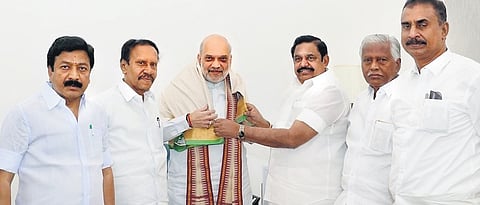

The meeting of AIADMK general secretary Edappadi K Palaniswami with Union home minister and senior BJP leader Amit Shah on Tuesday in Delhi appeared to spell a rapprochement between the two parties. The duo last met 18 months ago, and the AIADMK unilaterally walked out of the alliance shortly after that meeting. Since then, EPS has worked hard to establish the party’s independence from the BJP, woo minority communities that were put off by the alliance and reassert the AIADMK as a force in Tamil Nadu. Yet, it has struggled to build an alliance without the BJP strong enough to challenge the DMK’s coalition, which has been largely unchanged since 2019. In the 2024 Lok Sabha elections, which the DMK swept, the BJP succeeded in increasing its vote share, while the AIADMK faced the ignominy of losing its deposit in seven seats. Had they been in an alliance and assuming a transfer of votes, they might have picked up around a dozen seats. Still, it was only a year later that EPS began softening his stance towards the BJP and refusing to foreclose the possibility of an alliance with any party, if it meant putting up a strong challenge to the DMK. With Tuesday’s meeting, the political landscape in Tamil Nadu has thus undergone change once again.
The AIADMK’s patch-up with the BJP comes amid internal and external pressures the party is facing and leaves it open to the criticism of being the BJP’s handmaiden in the state. For the BJP—which has four seats in the assembly, thanks to its 2021 tie-up with the AIADMK—the reunion allows it to expand in Tamil Nadu, which has proved largely unreceptive to its overtures so far. The ruling DMK, on the other hand, will enter the fray in 2026 with the baggage of anti-incumbency as well as a more unified opposition; the vote split that supported its sweep in 2024 may not help it this time. The positive for it may be that its restless allies may have less leverage at the seat-sharing talks as they would face the BJP, who they all agree to disagree with.
By reuniting with the BJP, the AIADMK might be attempting a calculated risk of opting for short-term benefits to steady the party. In the long term, it must be awake to the possibility of ceding some of its base to the national party.